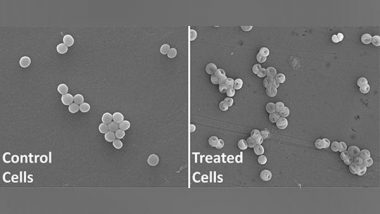Roorkee (Uttarakhand) [India], March 11 (ANI): Researchers at the Indian Institute of Technology Roorkee (IIT Roorkee) discovered a new antibacterial small molecule (IITR00693) that could help the fight against drug-resistant infections.
The research was led by Prof Ranjana Pathania, Department of Biosciences and Bioengineering, IIT Roorkee, along with Mahak Saini, IIT Roorkee; Amit Gaurav, IIT Roorkee; Ashish Kothari, AIIMS, Rishikesh; Balram Ji Omar, AIIMS, Rishikesh; Varsha Gupta, Government Medical College and Hospital, Chandigarh; Amitabha Bhattacharjee, Assam University.
Also Read | ADR Report on Political Funding Says National Parties Collected Rs 17,249.45 Crore From Unknown Sources.
According to the IIT Roorkee statement, the molecule, discovered after a rigorous screening process, has shown potent antibacterial activity against a wide range of Gram-positive and Gram-negative bacteria, including some of the most problematic drug-resistant strains.
With many bacterial infections becoming resistant to existing treatments, the discovery of this new molecule offers the potential for more effective and targeted therapies. IITR00693 acts like a dual sword; it not only strikes down the most stubborn bacteria but also prevents the emergence of resistance, ensuring that it remains effective for generations to come, said the statement.
Also Read | Rainfall on March 13 to 18 in India: Onset of Pre-Monsoon Showers May Lead to Crop Damage, Say Met Experts.
The rise of antibiotic resistance among skin-infecting pathogens poses an urgent threat to public health and has fueled the search for new therapies. Enhancing the potency of currently used antibiotics is an alternative for the treatment of infections caused by drug-resistant pathogens. IITR00693 potentiates the activity of polymyxins against two notorious multidrug-resistant skin-infecting pathogens, Staphylococcus aureus and Pseudomonas aeruginosa, providing a crucial leg up in the ongoing battle against deadly superbugs.
The statement further said the combination has a novel dual mode of action that de-energizes the bacterial cells and obliterates their membrane. The combination shows a very low propensity for resistance development, which is a major concern with many antibiotics on the market today.
Talking about the discovery, IIT Roorkee Director Prof KK Pant said, "We are now working to further develop the molecule into a viable therapeutic agent that can be tested in clinical trials. This is an important step in the development of new antibiotics, as it will allow for the evaluation of the molecule's safety, efficacy, and potential side effects in soft and skin tissue infections."
The findings are published in the American Chemical Society Journal - ACS Infectious Diseases and are featured on the cover page of the journal. This could open new research avenues on treatment options for soft and skin tissue infections.
Prof Ranjana Pathania, Department of Biosciences and Bioengineering, IIT Roorkee, said, "We aimed to identify a small molecule that can potentiate currently used antibiotics. IITR00693, a novel antibacterial small molecule, potentiates the antibacterial activity of polymyxin B against Staphylococcus aureus and Pseudomonas aeruginosa. Herein, we investigated in detail the mode of action of this interaction and the molecule's capability to combat soft-tissue infections caused by S aureus and P aeruginosa."
Mahak Saini, Department of Biosciences and Bioengineering, IIT Roorkee, who is among the research paper's authors, highlighted, "The results indicate that IITR00693 has the highest safety index and efficacy. The synergy between IITR00693 and polymyxin B against Gram-positive S. aureus was intriguing, as polymyxin B is specifically active against Gram-negative bacteria; hence we selected this combination for further detailed investigations." (ANI)
(The above story is verified and authored by ANI staff, ANI is South Asia's leading multimedia news agency with over 100 bureaus in India, South Asia and across the globe. ANI brings the latest news on Politics and Current Affairs in India & around the World, Sports, Health, Fitness, Entertainment, & News. The views appearing in the above post do not reflect the opinions of LatestLY)













 Quickly
Quickly


